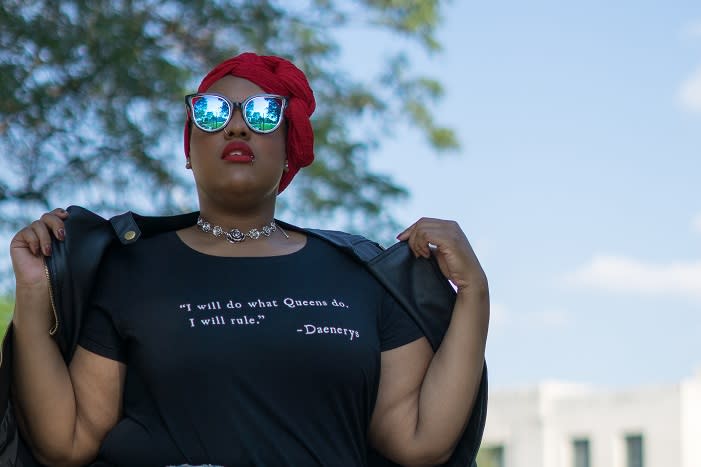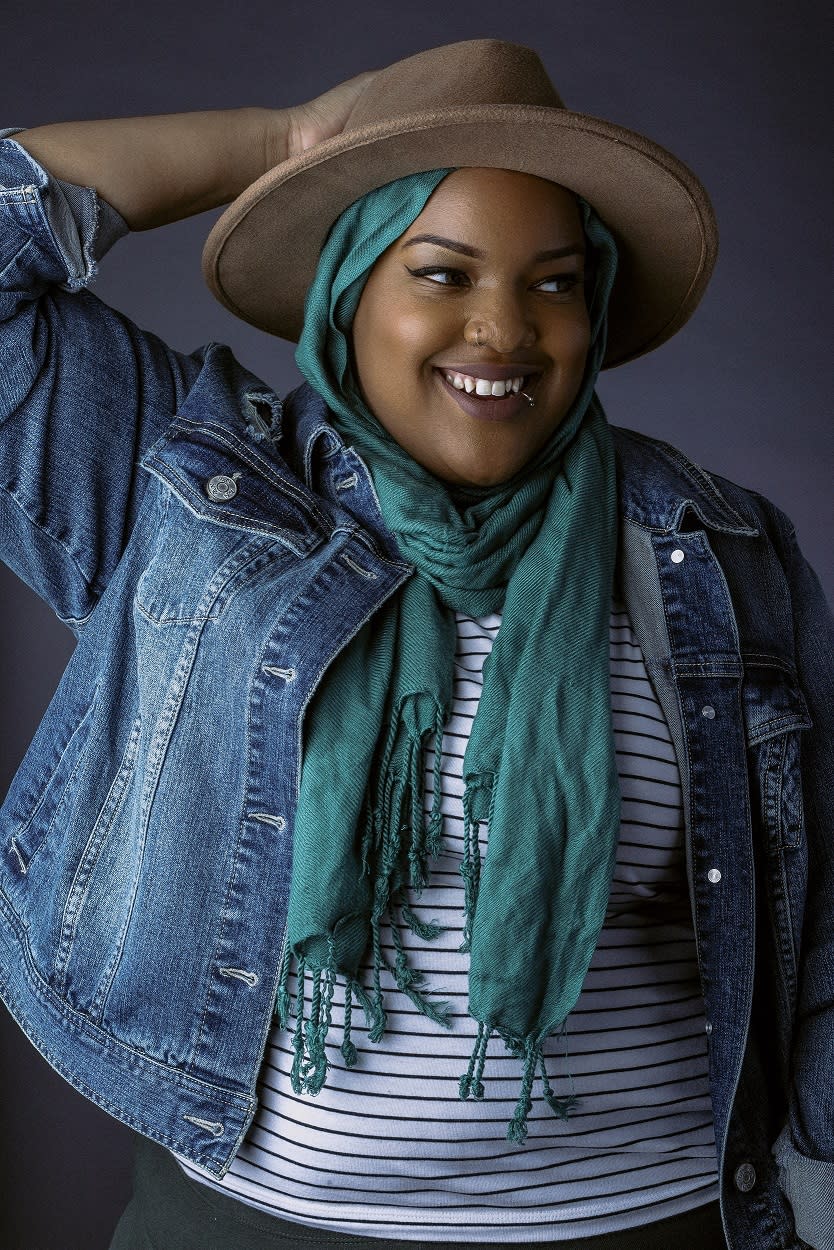How Muslim style star Leah Vernon decided 'to be myself, unapologetically'

Leah Vernon is the consummate modern hyphenate. When asked to describe her career, the 30-year- old blogger turned Instagram star turned YouTube star says, “Right now, I’m a body-positive activist, Muslim feminist influencer, and a writer.”
So how did the Detroit-based internet phenomenon hone her multifaceted skills? Through her love of fashion, of course.
“Back in the early 2000s, I was really obsessed with modeling,” Vernon tells Yahoo Lifestyle. But, she clarifies, “I was also a short fat black girl who was really poor. So I didn’t fit any of the molds of what it was to be a model.”
Vernon’s mom and brother were booking modeling jobs, however, and Vernon would accompany them when they would work — an experience she describes as “heartbreaking, because I thought it would be so cool to do this, but then it’s like, ‘No — you don’t look the part.’”

So Vernon decided instead to focus on her writing. She started a blog “that failed miserably” and a YouTube channel that also went nowhere. Then, in 2013, she decided to try again, launching a new blog called Beauty and the Muse, the name for which just popped into her head one morning.
Initially, Beauty and the Muse was strictly devoted to fashion and fashion-show coverage. But the response to Vernon’s take on those topics led to something unexpected.
“I was getting fan messages from around the world, people saying, ‘I’ve never seen a fat black Muslim girl talking about this stuff’ — and I was getting these messages from girls half my size,” Vernon recalls. “So I went from talking about fashion to body-image issues to religion to feminism.”
But also, Vernon says, her focus on fashion also came as a direct result of the ways she struggled as a child and young adult.
“When I was younger, my father wasn’t really there at all, and when he was, he was fat-shaming me,” she says. “He would make fun of how big I was compared to my stepsister and the clothes I would wear. Because I was a big girl, I didn’t have clothes that were fashionable.” That wasn’t all.
As one of the only black children in her neighborhood — and one of the only Muslim children too — she says she would regularly get called “a nun” by teasing boys on her street, who would mock her hijab and the way that she dressed.
“It only got worse when I got older,” Vernon notes. “I was homeschooled my entire life until I was 16, when I went to college. And then I went to college and I didn’t know where I fit in.”
Vernon says that when she went to college, she struggled with the decision of whether to wear her hijab, or, as she puts, it, “To stand out or not, to feel normal or not.”
Furthermore, she says, “My weight was up and down, and I had an eating disorder — I felt like if I was thinner, I would get the boy, get the job, get the attention.”
After marrying early, Vernon reckoned with even more identity issues resulting from what it means to be “married to a Muslim man … and how a Muslim woman should act, how she should be seen relative to her husband in society.”
“I was getting really tired of having to fit into all of these molds of what Muslim people wanted from me, of what black people wanted from me, of what thin people wanted from me. The turning point for me was that I was very angry and I didn’t know who I was. And then I realized you can be fat and educated, you can be fat and fierce as fuck, you can be fat and Muslim,” Vernon says. “You can choose to be miserable and angry and allow other people to dictate your happiness and your self-image or you can say, ‘No — I am a strong, independent woman who is all of these things and more.’ And I decided I was going to be myself, unapologetically.”
Which is why Vernon wishes she could tell her younger self “to stop taking validation from outside sources — that will never fill you. That’s what I found out as I got older and I started to look within. I realized I was the only one who could change my own mindset.”

Likewise, Vernon says she wishes she could tell all younger girls looking to her as a role model to “stop seeking validation and do what feels right. If you want to wear black lipstick and black nail polish, do that. I used to! And people made fun of me for being this weird girl and I’m this bombshell woman now — and I would never be me without her. So keep saying weird shit and being your weird self, unapologetically.”
And despite achieving indisputable influencer status through social media, Vernon is also wary of its pull.
“The validation we seek can be overbearing, especially with social media. We all want engagement and likes and popularity. But that comes when you’re OK with yourself,” Vernon says. “No lies, when I stopped giving a fuck about being in the in-crowd of the Instagram crowd is when my career blew up. I’m living my truth — so I would tell other people to live your truth too.”
Still, Vernon says being a role model isn’t always easy.
“Being an influencer and a role model, sometimes you feel like people want things from you that you cannot give them. I’ve become people’s therapist, I get sent private messages, people ask me questions about everything from abortion to what to do if their husband is cheating on them,” Vernon says. “I never went to school to be a psychiatrist or a psychologist. And people really value my opinion, but I don’t want to tell them the wrong thing, or sway them to do something they might regret.”
Instead, Vernon says that what she hopes she can do for her fans and followers is “give you that spark to give you that confidence about wherever you’re headed in life.”
Likewise, as a self-identified feminist, Vernon says she also hears from plenty of people who say, “Oh, do you hate men?”
To that she replies, “Yeah, I’m a powerful feminist — and some people who call themselves that are ridiculous, but there is the other powerful part of the group fighting for people’s rights. I would rather feminism not be needed. The world should be equal, right? People would rather not have to spend time marching and creating blog posts and signing petitions because we should all already be equal, right?”
But once again, for Vernon, it often all comes back to fashion — especially when it comes to feminism.
“I feel feminist as fuck when I can express myself through makeup, or not. Through fashion, or through being androgynous. The ability to express myself through beauty and fashion and to push the narrative of feminism and equal expression for women and girls who in other countries can’t do that is a part of what my feminism itself is,” says Vernon. “Everyone understands fashion. Everyone has a fashion sense. So that’s why I push my message of feminism and women’s empowerment and expression and art through [beauty and fashion] because it’s universal and if I can put a message in there and if girls can feel you can wear what you want to wear, put on your face whatever you want — or put nothing on your face at all — then I’m furthering the message. You have the option as a woman and a girl to do what you want to do.”
For evidence of that, look no further than Vernon’s latest video on body positivity, in which she shows herself dancing through the streets of Detroit.
“I’ve never danced professionally or on camera like that,” she explains. “I wanted to push feminist expression and say, I’m fat, black and Muslim, dancing in the streets of Detroit looking fierce, looking bomb. You can look this way or any way and look super fierce and confident and you can be yourself unapologetically.”
After all Vernon — who is presently working on her memoir, a series of “essays about me — fat shaming, mental illness, divorce, modeling, my childhood and all the stories good and bad that make me, me” — makes more than clear that to her, body positivity is nothing more than “living the best life in the body you have now.”
“Body positivity isn’t just for fat women, but for all bodies. We put all these limitations on ourselves — if I lost 10 pounds., I could do this. If I had a bigger booty, I could get this kind of man. We put all these restrictions on ourselves based on our size and socioeconomic status and we put all these limitations on ourselves, and why?”
She concludes: “Body positivity is my foundation. It’s me. And I will always keep pushing that agenda for men and women alike.”
Read more from Yahoo Lifestyles
Long Beach Settles Lawsuit After Police Forcibly Remove Woman’s Hijab
Muslim-American Woman’s Calm Response to Verbal Harassment Goes Viral
Curvy actress admits that her ‘weight was an issue for casting directors’
Follow us on Instagram, Facebook, and Twitter for nonstop inspiration delivered fresh to your feed, every day.


